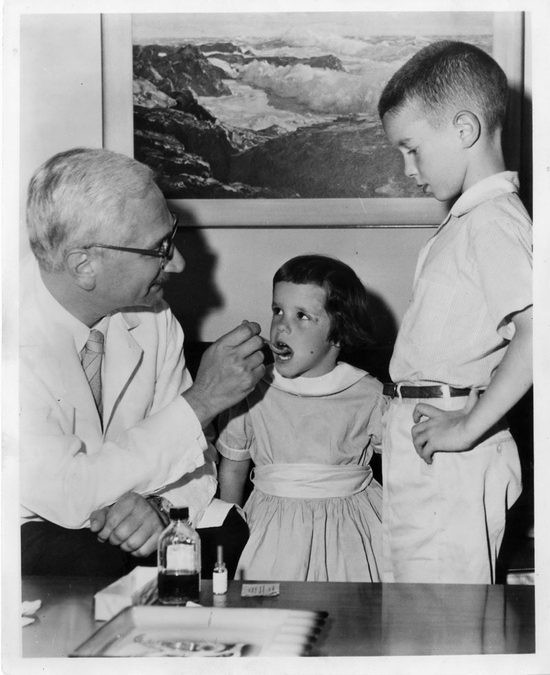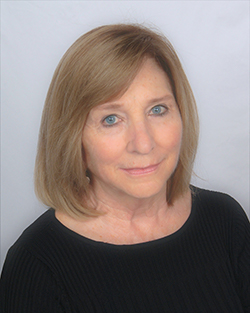 Dr. Albert B. Sabin, developer of the oral polio vaccine, donated his complete correspondence, laboratory materials, manuscripts, awards and medals to the University of Cincinnati. His papers document both the development and testing of the oral polio vaccine and the growth of virology as a discipline.
Dr. Albert B. Sabin, developer of the oral polio vaccine, donated his complete correspondence, laboratory materials, manuscripts, awards and medals to the University of Cincinnati. His papers document both the development and testing of the oral polio vaccine and the growth of virology as a discipline.
In 1995, the John Hauck Foundation helped the Cincinnati Medical Heritage Center (now the Henry R. Winkler Center for the History of the Health Professions) establish the Hauck Center for the Albert B. Sabin Archives. An initial gift provided funds for an archivist to organize and preserve Dr. Sabin’s collection. Later, the Hauck Foundation provided the Winkler Center with two additional donations that helped with the construction of the Winkler Center’s new home and the building of the John Hauck Foundation Gallery in the space.
Recently, selections of the Albert B. Sabin Papers Laboratory Notebooks were digitized with another gift from the John Hauck Foundation. The digitized materials were added to UC’s online repository, Scholar@UC available at https://scholar.uc.edu/ (search “Sabin Notebooks”). The physical collection of laboratory notebooks holds the entirety of Sabin’s laboratory work during his time at Cincinnati Children’s Hospital Research Foundation and the University of Cincinnati (1935 to 1969), including his service to the United States during World War II.
To close and celebrate this most recent project, the Winkler Center will produce a series of lectures dealing with Sabin, his research and the field of virology.
~~~~~~~~~~~~~~~~~~~~~~~~~~~~~~~~~
“Albert B. Sabin: Lab Book Stories and Lessons”
Thursday, Oct. 10, 5:00-7:00 p.m., in the CARE/Crawley Atrium, 231 Albert Sabin Way
A keynote address and reception featuring Karen Torghele, MPH, and Larry J. Anderson, MD.
 Karen Torghele, MPH, most recently worked through the Centers for Disease Control and Prevention (CDC) David J. Sencer Museum on the Global Health Chronicles Project to design, conduct and edit over 80 oral histories of scientists and other contributors to the history of the CDC. Previously, she worked for five years as an informatician at The Task Force for Global Health. She also helped design and coordinate The CDC Experience for medical students. She is a member and participant in Biographers International.
Karen Torghele, MPH, most recently worked through the Centers for Disease Control and Prevention (CDC) David J. Sencer Museum on the Global Health Chronicles Project to design, conduct and edit over 80 oral histories of scientists and other contributors to the history of the CDC. Previously, she worked for five years as an informatician at The Task Force for Global Health. She also helped design and coordinate The CDC Experience for medical students. She is a member and participant in Biographers International.
 Larry J. Anderson, MD, is professor and Marcus Chair of Infectious Diseases, Division of infectious Diseases, Department of Pediatrics, Emory University School of Medicine. Dr. Anderson joined Emory University School of Medicine in 2010 after over 30 years at the Centers for Disease Control and Prevention (CDC). He has worked on epidemiology, disease burden and pathogenesis of non-influenza respiratory viruses, especially respiratory syncytial virus, and viral vaccine preventable diseases including the global polio eradication laboratory program and measles, mumps, rubella and varicella-zoster vaccination programs.
Larry J. Anderson, MD, is professor and Marcus Chair of Infectious Diseases, Division of infectious Diseases, Department of Pediatrics, Emory University School of Medicine. Dr. Anderson joined Emory University School of Medicine in 2010 after over 30 years at the Centers for Disease Control and Prevention (CDC). He has worked on epidemiology, disease burden and pathogenesis of non-influenza respiratory viruses, especially respiratory syncytial virus, and viral vaccine preventable diseases including the global polio eradication laboratory program and measles, mumps, rubella and varicella-zoster vaccination programs.
In addition, the Winkler Center is hosting a lunchtime lecture series from 12:00-1:00 p.m. in the Stanley J. Lucas, MD Boardroom on the following dates:
- Thursday, Oct. 17, Dr. David Bernstein, “Developing a Vaccine from Sabin to Rotarix”
Dr. David Bernstein has been at CCHMC for over 35 years and rose through the ranks of assistant, associate and full professor to become the infectious disease division director in 2000. His tenure as division director saw a rapid rise in research, training and clinical care. Dr. Bernstein’s interest is primarily in the field of vaccinology and virology. Over the past 30 years he has contributed to the development of several vaccines; most notable rotavirus, norovirus, herpes viruses and influenza and he has published over 300 manuscripts in this field. The rotavirus vaccine now marketed as Rotarix around the world was first developed by Dr. Bernstein and his colleague Dr. Richard Ward. He has also been actively involved in the clinical evaluation of vaccines for several STIs including HSV, CMV, and HPV, agents of bioterrorism including small pox and anthrax, and many childhood vaccines. He has been the PI of one of the NIH funded Vaccine Treatment Evaluation Units (VTEUs) for over 15 years and has led several large studies in adolescents. His international recognition as a vaccinologist has contributed to the outstanding reputation of the Infectious Diseases Division of CCHMC.
- Thursday, Oct. 31, Dr. Paul Spearman, “Ebola Virus Outbreaks and Current Vaccine Approaches”
Paul Spearman, MD is the Albert B. Sabin Professor and Director of Infectious Diseases at Cincinnati Children’s Hospital Medical Center. His laboratory studies fundamental aspects of HIV biology and develops new vaccines for human pathogens. HIV assembly processes are a major focus of the laboratory, including the trafficking of the HIV envelope glycoprotein and its interaction with essential host factors. A related project studies how HIV interacts with macrophages and microglia. Dr. Spearman and his colleagues in the CCHMC Vaccine and Treatment Evaluation Unit (VTEU) are engaged in the design and performance of clinical trials for new vaccines in adults and children, with a special interest in employing cutting-edge technologies to define innate and adaptive immune responses to vaccines. Dr. Spearman is currently leading trials for Ebola and avian influenza vaccine development.
Dr. Spearman serves on the Board of Scientific Counselors for NCI, the Vaccines and Related Biological Products Advisory Committee for the FDA, and is President of the Pediatric Infectious Diseases Society (PIDS). Beyond his research interests, Dr. Spearman is a Pediatric ID clinician and enjoys caring for children and mentoring future leaders in Infectious Diseases.
- Tuesday, Nov. 5, Dr. Robert Frenck, “Vaccines and the Ongoing Legacy of Dr. Sabin: An Ounce of Prevention is Better Than a Pound of Cure!”
Robert W Frenck, Jr, M.D. is a Professor of Pediatrics in the Division of Infectious Diseases and the Executive Chair of the IRB at Cincinnati Children’s Hospital Medical Center. Dr Frenck received his BA from the University of Calif at San Diego and his M.D. from the Univ of Texas Health Science Center at Houston (UTHSC). He completed a pediatric residency at the National Naval Medical Center and a fellowship in Pediatric Infectious Diseases at UTHSC. Dr Frenck has been a member of the American Academy of Pediatrics (AAP) Committee on Infectious Diseases (Red Book Committee) as well as on the Executive Committee of the AAP Section on Infectious Diseases (SOID) and Chair of the SOID Education Committee. He has published over 100 articles in the peer reviewed literature with a focus on infectious diseases and vaccines.
An ongoing exhibit highlighting the work of Albert Sabin will be on display in the foyer of the Donald C. Harrison Health Sciences Library, CARE/Crawley, 231 Albert Sabin Way. All events are free and open to all.
These programs are financially assisted by the John Hauck Foundation, Fifth Third Bank, John W. Hauck and Narley L. Haley, Co-Trustees.
